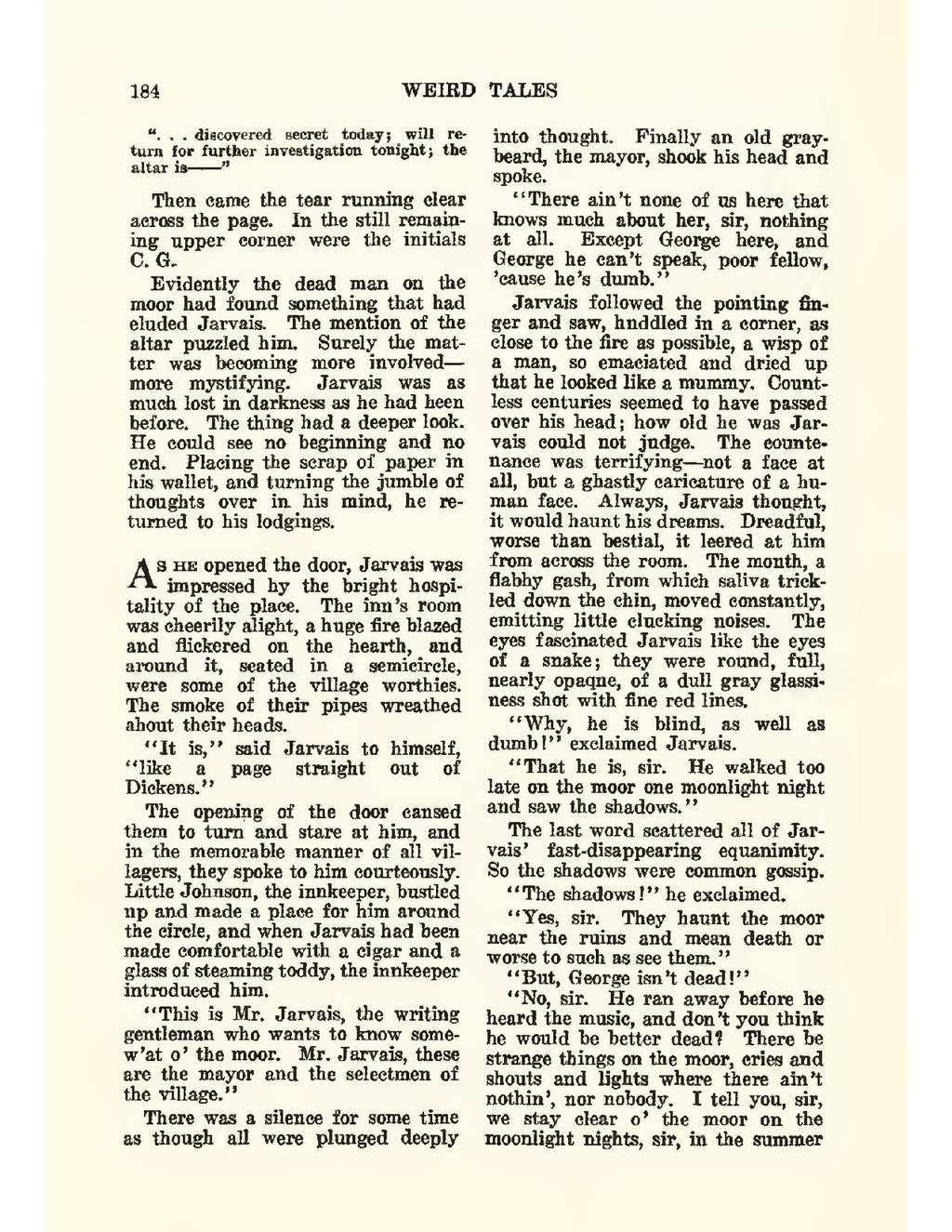“. . . discovered secret today; will return for further investigation tonight; the altar is——”
Then came the tear running clear across the page. In the still remaining upper corner were the initials C. G.
Evidently the dead man on the moor had found something that had eluded Jarvais. The mention of the altar puzzled him. Surely the matter was becoming more involved—more mystifying. Jarvais was as much lost in darkness as he had been before. The thing had a deeper look. He could see no beginning and no end. Placing the scrap of paper in his wallet, and turning the jumble of thoughts over in his mind, he returned to his lodgings.
As he opened the door, Jarvais was impressed by the bright hospitality of the place. The inn’s room was cheerily alight, a huge fire blazed and flickered on the hearth, and around it, seated in a semicircle, were some of the village worthies. The smoke of their pipes wreathed about their heads.
“It is,” said Jarvais to himself, “like a page straight out of Dickens.”
The opening of the door caused them to turn and stare at him, and in the memorable manner of all villagers, they spoke to him courteously. Little Johnson, the innkeeper, bustled up and made a place for him around the circle, and when Jarvais had been made comfortable with a cigar and a glass of steaming toddy, the innkeeper introduced him.
“This is Mr. Jarvais, the writing gentleman who wants to know somew’at o’ the moor. Mr. Jarvais, these are the mayor and the selectmen of the village.”
There was a silence for some time as though all were plunged deeply into thought. Finally an old graybeard, the mayor, shook his head and spoke.
“There ain’t none of us here that knows much about her, sir, nothing at all. Except George here, and George he can’t speak, poor fellow, ’cause he’s dumb.”
Jarvais followed the pointing finger and saw, huddled in a comer, as close to the fire as possible, a wisp of a man, so emaciated and dried up that he looked like a mummy. Countless centuries seemed to have passed over his head; how old he was Jarvais could not judge. The countenance was terrifying—not a face at all, but a ghastly caricature of a human face. Always, Jarvais thought, it would haunt his dreams. Dreadful, worse than bestial, it leered at him from across the room. The mouth, a flabby gash, from whieh saliva trickled down the chin, moved constantly, emitting little clucking noises. The eyes fascinated Jarvais like the eyes of a snake; they were round, full, nearly opaque, of a dull gray glassiness shot with fine red lines.
“Why, he is blind, as well as dumb!” exclaimed Jarvais.
“That he is, sir. He walked too late on the moor one moonlight night and saw the shadows.”
The last word scattered all of Jarvais’ fast-disappearing equanimity. So the shadows were common gossip.
"The shadows!” he exclaimed.
“Yes, sir. They haunt the moor near the ruins and mean death or worse to such as see them.”
“But, George isn’t dead!”
“No, sir. He ran away before he heard the music, and don’t you think he would be better dead? There be strange things on the moor, cries and shouts and lights where there ain’t nothin’, nor nobody. I tell you, sir, we stay clear o’ the moor on the moonlight nights, sir, in the summer
